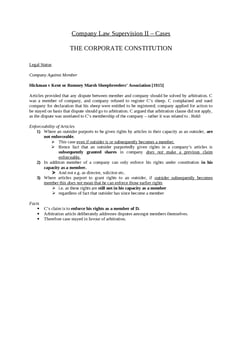Greenhalgh v Arderne Cinemas Ltd [1951] ch 286
Judgement for the case Greenhalgh v Arderne Cinemas Ltd
KEY POINTS
Under company law, within a private company, where the articles contain provisions that restrict the transfer of shares to members, a majority resolution may be passed authorizing the sale of shares to individuals who are not existing members.
The validity of such a resolution hinge on whether it was passed in good faith for the benefit of the company.
FACTS
A private company with a nominal capital of £31,000, divided into preference and ordinary shares, faced a legal dispute. A key clause in the articles of association restricted share transfers to non-members unless an existing member was willing to purchase at a fair value.
Following an agreement between a major shareholder and a third party, resolutions were proposed and passed to allow transfers of shares to the third party. Under company law, special resolutions can be challenged if they are not passed in good faith to benefit shareholders.
Discrimination between majority and minority shareholders, with advantages granted to the former, can also render such resolutions vulnerable to challenge. Shareholders voting for these resolutions need not disregard their interests, but if an offer from an external party is deemed fair, it should not invalidate the resolution.
The plaintiff, a minority shareholder, challenged these resolutions, claiming they favoured the majority. The issue was for the interpretation of the "benefit of the company as a whole" and whether the resolutions discriminated against minority shareholders.
JUDGEMENT
It was held that the special resolution, having been genuinely and in good faith passed, could not be objected to on the grounds that it lifted the restriction in the original articles regarding sales to non-members of the company.
The fact that this change would result in the loss of the minority shareholders' right to tender for the majority holding of shares did not provide valid grounds for impeaching the special resolution.
COMMENTARY
The special resolutions requiring higher approval thresholds should genuinely serve the collective interests of shareholders, prioritizing their well-being over the company as a separate entity.
A special resolution may be invalidated if it unfairly benefits majority shareholders at the expense of the minority, neglecting their interests. In this instance, the company's articles stipulated that shares could only be transferred to members at a fair value set by company guidelines.
A crucial development occurred when the second defendant agreed to sell ordinary shares to a third party, "the purchaser," at a fixed rate per share. An extraordinary meeting was convened to propose an amendment to the articles, allowing share transfers to specific transferees with ordinary resolution approval during general meetings, thus altering existing restrictions.
Assuming this amendment passed, it was proposed to authorize the transfer of 500 shares to the purchaser. The plaintiff contested the validity of these resolutions, alleging that they disadvantaged minority shareholders in favour of the majority.
The judgment upheld the special resolution's validity, as it was passed in good faith, unchallengeable on the grounds of removing the restriction on selling shares to non-members.
ORIGINAL ANALYSIS
Director of company wanted to sell shares to a third party. Company’s articles provided for right of pre-emption for existing members. Director successfully got special resolution passed removing this right of pre-emption from articles.
Claimant, a member of company, challenged this.
Lord Evershed MR
Bona fide for benefit of company as a whole means shareholder must do what, in his honest opinion, is for benefit of company as a whole.
However if there is discrimination towards minority shareholders, resolution will be invalid.
‘Company as a whole’ does not mean company as a distinct entity, but rather shareholders as a body.
Contradiction – Evershed proposes subjective test, but later states that if there is discrimination (an objective concept), resolution is invalid.
RELATED CASES
For Further Study on Greenhalgh v Arderne Cinemas Ltd
Need instant answers? Our AI exam tutor is here to help.
Ask questions 🙋 Get answers 📔 It's simple 👁️👄👁️
Our AI is educated by the highest scoring students across all subjects and schools. Join hundreds of your peers today.
Get StartedSimilar Cases
Related Product Samples
These product samples contain the same concepts we cover in this case.
| Company Law | Minority Rights And Remedies Cases (9 pages) |

